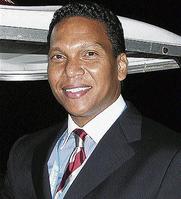
Dehring Accused of doing a bad job in negotiating with the International Cricket Council (ICC) for the staging of the Cricket World Cup, Chris Dehring, chief organiser of the event has responded to critics in a letter to the Sunday Gleaner.
Among the damning criticism Dehring and his team has faced, is that the Caribbean is going to be making far less money from media rights than Global Cricket Corporation, the official media rights owners of the event.
Says Dehring in his letter:
"In 1998, with the full know-ledge and encouragement of the CARICOM Heads of Government, the WICB bid for, and won the right to host the 2007 Cricket World Cup. That negotiating team was lead by the Hon. Pat Rousseau, O.J. The WICB's prime purpose was to use the event to generate revenues for the re-development of the sport in the region, while ostensibly governments were keen to leverage the event for its wider benefits including media exposure and tourism enhancement. No con-tractual terms were yet known or available."
"In 2001, the ICC signed a contract with the Global Cricket Corporation (GCC) giving them exclusive commercial rights to the ICC tournaments. This deal guaranteed the ICC a total of US$550 million for all the ICC tournaments to be staged between 2001 and 2007, ending with the Cricket World Cup in 2007. It also included the Cricket World Cup staged in South Africa in 2003. The terms and conditions of the tournaments which the ICC would have to deliver in order to receive these funds are contained in a Master Rights Agreement (MRA). The host of each ICC tournament, along with the 98 member countries of the ICC, receives a pre-determined share of that US$550m as each tournament is staged. In addition to its share of the commercial rights, there are other ancillary rights retained by the tournament host, primarily ticket revenues, licensing and merchandising."
In 2003, the WICB signed the Host Agreement (HA) with the ICC for the Event, which for obvious reasons, mirrors the MRA. The HA outlines the terms and conditions which the ICC, and consequently any host of an ICC tournament, must deliver in order to satisfy the MRA. It is reasonable to question whether WICB as a tournament host could have negotiated different terms in the HA in 2003 from what ICC had already contractually committed to in its MRA two (2) years before in 2001. Clearly this would have been highly unlikely as, for ICC to agree to any changes, they would need to renegotiate their MRA with the GCC and possibly suffer financial losses. Given the income expectations of their 98 ICC member countries from that deal, it is a risk ICC was unlikely to take. There were also other countries willing to host the event on the basis of the HA should the West Indies have declined to do so, and South Africa had already hosted the 2003 edition under those exact terms.
Requirements of hosting
"In 2004, WICB sought coun-tries in the Caribbean willing to host matches in CWC 2007 under the terms of the HA. This was done through a systematic Host Venue Selection Process (Bid Process). WICB and CWC 2007 Inc. wished to ensure that countries knew and understood before hand what they were undertaking in deciding whether or not to bid to host matches in the Cricket World Cup. Each country was provided with a 298-page Bid Book which contained the technical specifications and requirements of hosting the event and a Host Venue Agreement (HVA) which mirrored WICB's and ICC's obligations in the HA and MRA, respectively. Any country which opted to bid for matches made a formal Bid Submission and executed a copy of the HVA. The award of matches was based on the voluntary Bid Submissions, signed HVAs and Government Guarantees submitted by each country. Some countries which received Bid Books declined to offer themselves as hosts including Dominica, The Bahamas and Anguilla. Other countries which submitted bids were not awarded including the USA and Bermuda."
Alternate host
"If there were insufficient host countries in the West Indies willing to undertake the tremendous challenged posed, WICB would have simply given back the opportunity to the ICC who could then award it to a host. Indeed, South Africa and Australia had already indicated their willingness and were on standby. The nine Caribbean countries which volunteered as Host Venues were subsequently awarded matches in the event. Countries were then given a formal Notice to Proceed with the execution of their bid (stadium construction, etc.) after the Award of Matches. In 2004, the Heads of Government of CARICOM and WICB also agreed on a profit share arrangement for the tournament." Under this agreement:
(i)The Local Organising Committees (LOCs) which were established by each Government will receive the ticket revenue, less a contribution to the cost of the ticketing operations. Individual governments have made their own decision on how these funds are to be used, but most governments appear to be retaining these funds in order to help offset the substantial investment they have made.
(ii)The WICB will receive their host's share of the commercial rights and also bear all CWC 2007 Inc. costs of running the event (prize money, staffing, event management, consultants, etc.) and match operation costs as defined in the HVA (team travel and accommodation, etc.). The surplus derived is to be shared between the WICB and its six (6) member territorial cricket boards for the development of cricket on an agreed ratio.
"Please note that the terms of this profit share arrangement were previously announced by the Heads of Government in July 2004".

